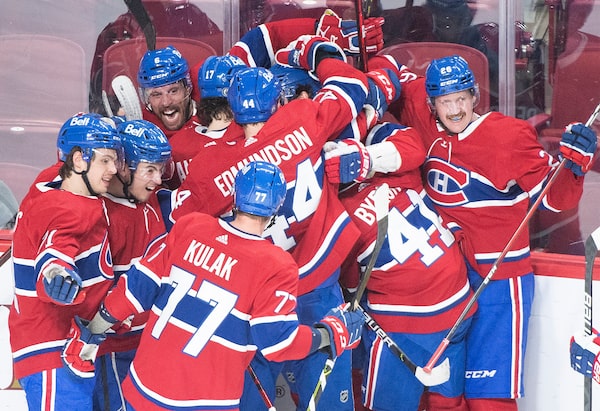
Montreal Canadiens’ Jesperi Kotkaniemi (15) celebrates with teammates after scoring against the Toronto Maple Leafs in Montreal on May 29. The Habs would go on to defeat the Maple Leafs in seven games, and the Winnipeg Jets in four, to advance to the third round of the playoffs.Graham Hughes/The Canadian Press
The playoff run that has brought the Montreal Canadiens eight wins away from the Stanley Cup prompted Quebec Premier François Legault to extend bar hours to allow the revelry that usually breaks out when Les Glorieux are on a run.
So far, he need not have bothered.
As the Montreal Canadiens face the Las Vegas Golden Knights for the right to move on to the Stanley Cup final, the playoff fever that usually grips the hockey-mad city has yet to appear beyond a sporadic outburst or two.
Instead of a release of pent-up energy from long months of COVID-19 sickness and death along with curfew and confinement, Montrealers appear to be taking a cautious approach, both to newfound liberty to get together and to the surprise success of their beloved hockey team.
Quebec was the hardest-hit Canadian province during the COVID-19 pandemic and Montreal was the epicentre. The city has about 5 per cent of Canada’s population, but 18 per cent of the country’s COVID-19 deaths, a large portion of them in the early months of the pandemic.
Laura Saba, a podcaster and keen observer of the cultural side of hockey, said the grim recent past hangs over the city. That awareness helped Montreal escape the ravages of the third wave and motivated Quebeckers to lead the country in vaccinations.
“The pandemic was extremely present in our lives and people have understood if we go too far the other way, we could end up back where we started,” said Saba, who co-hosts the Locked on Canadiens podcast. “The exuberance is there but people are cautious about expressing it.”
On Monday night, as the teams faced off for Game 1, the game was shown on dozens of restaurant and bar screens in the usually festive Plateau-Mont-Royal neighbourhood. In a normal playoff run, every bar and pizza joint with even a small screen would be busy. Seats Monday were mostly empty.
In past playoff years, a Montrealer could keep up with the Canadiens’ score by listening for the sound of neighbours’ jubilation out the window. This time, even the first playoff goal by fan-favourite rookie Cole Caufield failed to raise an audible stir.
As the Canadiens started to falter badly in the second period, many diehards started to drift away. When a gentle rain started to fall in the third period, most were already gone. The Habs lost 4-1. Game 2 is Wednesday night in Las Vegas.
While the pandemic continues to cast a shadow, other reasons help explain the muted enthusiasm. Most people have only had a single dose of vaccine. The weather’s been drizzly. The game played in Las Vegas was late, starting at 9 p.m. Montreal time. Monday was the first night many bars reopened at half-capacity and it was, after all, a Monday.
Many places have yet to open. The Fabuleux Chez Serge, one of the city’s most popular sports bars, remained closed as owner Paulo Branco was completing a move up Saint Laurent Boulevard. He hopes to be ready to open for the final. “I think the fever will start now,” Branco said. “Especially if the Canadiens get a win.”
Many hockey fans are also eying the team with wariness after it advanced by beating the cursed Toronto Maple Leafs and a Winnipeg Jets team that seemed more interested in starting summer holidays. That series in particular was over in four games before any drama could build. Many hockey experts have said the Canadian teams are inferior and it does appear the team from Nevada is a much stiffer challenge than the previous Canadian competition.
“Canadiens fans are like Wile E. Coyote waiting for the anvil to drop,” said Conor McKenna, host of The Morning Show on Montreal’s TSN 690 sports radio.
McKenna, like Branco and Saba, believes some nice weather and a win or two could spark the joy that has accompanied runs in the past. “If cases stay low, if the weather gets nice, this is a combination of factors that could get the city where we’d all like it to be,” McKenna said. “But first and foremost is winning. Wins would instill some confidence in all those people waiting for another shoe to drop.”
The last time the Montreal Canadiens were on such a playoff run, in 2014, Quebec was coming out of a particularly grim period. A public inquiry had exposed rampant corruption. The L’Isle-Verte seniors’ home fire had killed 32 people and the Lac-Mégantic train explosion killed 47 more over the year.
As the team advanced to become one of the final four teams in the Stanley Cup playoffs, people packed bars and danced in the streets from one end of Montreal to the other. The city and province got a huge lift when they desperately needed it.
Will this playoff run give Montrealers a similar morale boost coming out of the biggest crisis most city residents have ever seen? Saba thinks it is already happening, just in a quieter way than usual.
In many ways, she said, the team’s season is a mirror of the city’s 15 months of pandemic.
“We learned hard lessons early on. We became disciplined, careful, smart. Everybody played their role, did what was needed for the greater good. We stuck to the plan, it paid off,” she said. “Hopefully it continues on the ice as well.”
 Les Perreaux
Les Perreaux